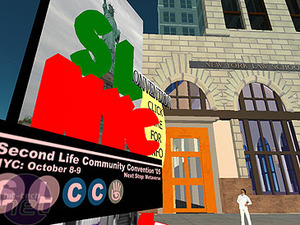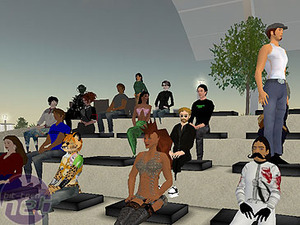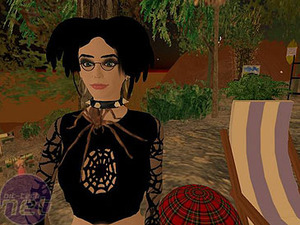The whole ruckus was over a land deal gone sour. He’d found a way to buy plots of land, good plots, on the cheap. He did a hush-hush deal with the auctioneer. But he got rumbled. He’s called in the lawyers, but everybody knows you don’t get plots that good that cheap…
Except this isn’t something from a film noir or hard-boiled crime fiction, but what happened, two months ago, in a massively multiplayer video game. The game in question is Second Life, a game where buying and selling land, property – in fact, anything that exists inside its digital world – is recognised and even encouraged by the game’s maker, Linden Lab.
The land deal in question involved a player who figured out how to bid on plots while they were in the queue to be auctioned, but before bidding was supposedly due to start. This meant he got them cheap: a neat little exploit or unfair play. Now it's up to the courts to decide.
It sounds like something straight out of William Gibson or Neal Stephenson - and a little bit too cyberpunk for its own good, the digital equivalent of ‘too cool for school’. But my argument is that Linden Lab has done something few game manufacturers have been willing to do. They have addressed an issue that will be absolutely critical for massively multiplayer online games in the next few years: ownership, user-generated content, and that old chestnut, IP rights.



 This is in marked contrast to World of Warcraft, a game with 6.5 million players compared to Second Life’s 65,000 paying players. According to Blizzard’s WoW Terms of Usage, "You acknowledge and agree that you shall have no ownership or other property interest in the [WoW] Account, and you further acknowledge and agree that all rights in and to the Account are and shall forever be owned by Blizzard Entertainment."
This is in marked contrast to World of Warcraft, a game with 6.5 million players compared to Second Life’s 65,000 paying players. According to Blizzard’s WoW Terms of Usage, "You acknowledge and agree that you shall have no ownership or other property interest in the [WoW] Account, and you further acknowledge and agree that all rights in and to the Account are and shall forever be owned by Blizzard Entertainment."
Pretty clear, then, and if WoW was a more traditional form of entertainment, it would also be pretty reasonable, too. After all, if you go and watch ‘Cars’ at the cinema, the experience is relatively passive; you don’t contribute to it in any physical way. You sit there, watch it, it’s over, and you leave. It’s similar with a game that’s primarily experienced off line, in single player mode, like Half-Life 2: Episode 1.
Except this isn’t something from a film noir or hard-boiled crime fiction, but what happened, two months ago, in a massively multiplayer video game. The game in question is Second Life, a game where buying and selling land, property – in fact, anything that exists inside its digital world – is recognised and even encouraged by the game’s maker, Linden Lab.
The land deal in question involved a player who figured out how to bid on plots while they were in the queue to be auctioned, but before bidding was supposedly due to start. This meant he got them cheap: a neat little exploit or unfair play. Now it's up to the courts to decide.
It sounds like something straight out of William Gibson or Neal Stephenson - and a little bit too cyberpunk for its own good, the digital equivalent of ‘too cool for school’. But my argument is that Linden Lab has done something few game manufacturers have been willing to do. They have addressed an issue that will be absolutely critical for massively multiplayer online games in the next few years: ownership, user-generated content, and that old chestnut, IP rights.


Passive Aggressive
According to Linden Lab's IP rights cheat sheet, Second Life’s Terms of Service agreement "Recognizes Residents’ right to retain full intellectual property protection for the digital content they create in Second Life, including avatar characters, clothing, scripts, textures, objects and designs. This right is enforceable and applicable both in-world and offline, both for non-profit and commercial ventures."

Pretty clear, then, and if WoW was a more traditional form of entertainment, it would also be pretty reasonable, too. After all, if you go and watch ‘Cars’ at the cinema, the experience is relatively passive; you don’t contribute to it in any physical way. You sit there, watch it, it’s over, and you leave. It’s similar with a game that’s primarily experienced off line, in single player mode, like Half-Life 2: Episode 1.

MSI MPG Velox 100R Chassis Review
October 14 2021 | 15:04










Want to comment? Please log in.